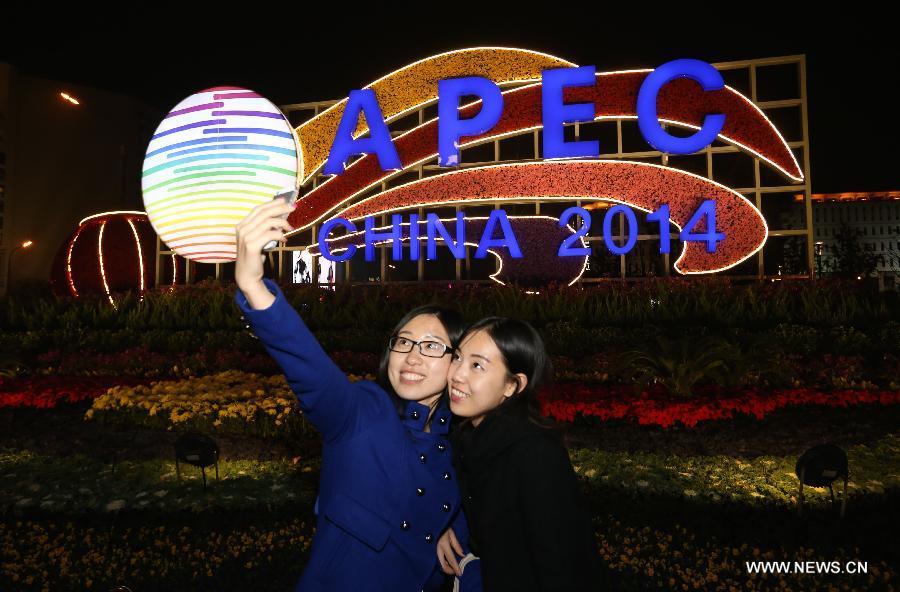APEC Summit: China on best behaviour, but guests may not be

BEIJING, Nov 6 — From territorial disputes with neighbours to rivalry with the United States, China is setting aside some of its biggest foreign policy challenges to prevent discord at a summit of Asia-Pacific leaders that it hosts next week.
One potential hotspot is the conflict in Ukraine, as US President Barack Obama and Russian President Vladimir Putin are both coming for the meeting.
So too is Australian Prime Minister Tony Abbott, who is furious with Russia over what he called the “murder” of Australian citizens in the downing of Malaysia Airlines Flight MH17 over Ukraine. He has promised to confront Putin.
For its part, China is dialling down the rhetoric on territorial rows with Japan and Southeast Asia, trade disputes and its backing of a new multilateral bank that is seen as a rival to US-backed institutions. It’s also trying to make sure Beijing’s notorious smog does not affect the most important international event it has hosted since the 2008 Olympics.
“China is going out of its way to be nice ahead of APEC (the Asia Pacific Economic Cooperation meeting),” said a Beijing-based foreign envoy. “It’s being treated as this year’s Olympics.”
APEC groups 21 economies which account for 40 per cent of the world’s population, 54 per cent of its economic output and 44 per cent of trade.
Foreign Minister Wang Yi told a forum last week that China wanted to host a “harmonious and smooth” APEC that would leave a “deep impression on history”.
Wang, usually not at ease before the foreign media, even took a few questions, promising that China would be a “good host” to Japan, with whom relations have soured since a row erupted over ownership of islands in the East China Sea and its prime minister’s visit to a shrine that honours those killed in battle.
Earlier in the week, State Councillor Yang Jiechi, who is China’s top diplomat, visited Hanoi and said he wanted a lasting solution to a bitter spat in the South China Sea that over the summer lead to anti-Chinese violence in Vietnam.
On another area of possible friction, China’s US$50 billion (RM167.3 billion) Asian Infrastructure Investment Bank, President Xi Jinping sought to set minds at ease last month by saying China wanted to learn from the World Bank and the Asian Development Bank, both of which count Washington and its allies as their biggest financial backers.
“China has made it very clear that this is the first big international hosting from the new leadership and they’re very serious about it,” Alan Bollard, head of the APEC Secretariat, told Reuters, although he admitted there was “more politics in the background” than at some other recent summits.
“Where I see potential political frictions, they are not ones that flow into the economic initiatives that are being proposed,” Bollard added.
Spick and span
In terms of making sure Beijing looks spick and span, some factories as far as 200 km away have been ordered closed, and in Beijing itself no marriages will be registered from November 7-12, as part of a host of measures to tackle the city’s often terrible traffic and air pollution.
Despite China’s best efforts, some of its own disputes with fellow APEC members will inevitably come up.
“Who are the Chinese happy with at the moment?” said a second Beijing-based foreign diplomat, who is involved in preparations for the summit, referring to the potential for disagreement.
Obama will confront Xi next week over deep US concerns about cyber spying by China’s government and military and will insist that it be stopped, senior US officials have said.
Japan is another obvious source of tension.
Despite growing expectations in Japan for Prime Minister Shinzo Abe to meet Xi for an ice-breaking chat, China appears unlikely to do more than just be polite rather than agreeing any substantive steps to improve ties.
Then there is Taiwan, not a normal source of APEC conflict.
The Global Times, a popular tabloid published by China’s official People’s Daily, slammed Taiwan President Ma Ying-jeou on Monday for his support of the pro-democracy protests in Hong Kong.
“No proper leader in all of East Asia has expressed such clear support for Hong Kong’s ‘Occupy Central’,” it said in an editorial. “The mainland doesn’t owe you anything; we hope you conduct yourself with dignity.”
Ma, like all Taiwan leaders, has never been able to attend an APEC summit despite being a member, due to the island’s broad lack of international recognition, and former vice president Vincent Siew will come in his stead.
Last year at the APEC summit in Bali, Xi ruffled Taiwan’s feathers by telling Siew that a political solution to a standoff over sovereignty lasting more than six decades cannot be postponed forever. Proudly democratic Taiwan has shown little interest in such talks with Communist-run China. — Reuters


No comments:
Post a Comment
Comments always welcome!